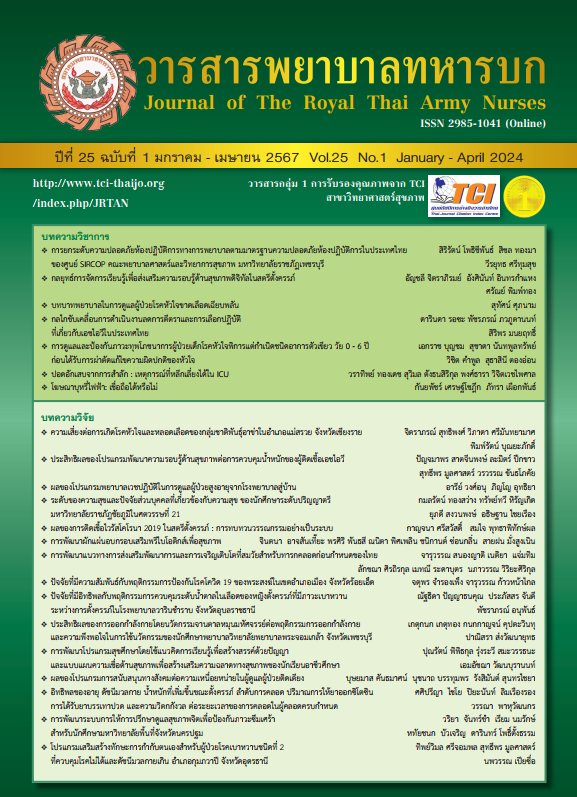Confirmatory Factor Analysis of Upper Primary School Students’ Scales: Attractive Behavior, Behavior for Protecting Friends from Bad Things, and Emotional Control Behavior
Keywords:
Exploratory and Confirmatory Factor Analysis, Attractive Behavior, Protect Friends from Bad Things Behavior, Emotion Control Behavior, Upper Primary School StudentsAbstract
The objective of this research was to examine the consistency between the structural model scales of attractive behavior, behavior for protecting friends from terrible things, and emotional control behavior for upper primary school students and empirical data. Samples consisted of 1,228 male and female students in upper primary schools in the Office of the Basic Education Commission, Bangkok Metropolitan administration, and the private education sectors. The research instruments were three questionnaires, tested by 5 experts for the content validity with indicies of item objective congruence: IOC of .80 – 1.00 and Cronbach’s alpha coefficients of .75, 87 and .72, respectively. Descriptive statistics, exploratory and confirmatory factor analyses were used for data analysis. The results showed that structural models of these scales had only one component and were consistent with the empirical data (χ2 = 4.90, df = 3, p = .18; χ2 = 12.34, df = 10, p = .26; χ2 = 6.42, df = 3, p = .093, respectively). The developed scales were appropriate for promoting student behaviors to prevent violence in family and society.
Downloads
References
Hillis S, Mercy J, Amobi A, Kress H. Global prevalence of past-year violence against children: A systematic review and minimum estimates. Pediatrics; 2016; 137(3): 1-13.
Girmen P, Kaya MF, Kilic Z. Violence at primary schools and its reflections on the press and the visual media in Turkey. International Journal of Research in Education and Science; 2018; 4(2): 703-13.
Graham CC. The effects of a violence prevention intervention on prosocial behavior and perception of school safety (Doctoral dissertation). Duquesne University; 2012.
Bhanthumnavin D, Meekhun K, Waninthanon N. Teachers and the promotion of ethics to students, questions, and answers. Thai Behavioral System Development Research Center Project mission and research coordination, National Research Council of Thailand, Bangkok; 2013. (in Thai)
Suwaanachote, K. Integrated causal factors of home, educational institution, and mental characteristics related to friendly behavior of undergraduate students. Term paper, Faculty of Social Development National Institute of Development Administration; 2005. (in Thai)
Phra Phromkunaphon PA Payutto. Expanded version of Buddhadhamma, Bangkok: Plitham Publishing House; 1999. (in Thai)
Thompson RA. Emotional Regulation: A theme in search of definition. Monographs of the society for research in child development; 1994; 15(2-3): 25-52.
Office of the Permanent Secretary, Ministry of Education. Information on schools under the Office of the Basic Education Commission; 2020. (in Thai)
Education Bureau. Statistics report, academic year 2021, schools under Bangkok. Bangkok: Phot Cardboard Shop; 2021. (in Thai)
Office of the Private Education Commission. Private education statistics for the year 2019. (in Thai)
Cohen J. Statistical power analysis for the behavioral sciences. (2nd ed.). Hillsdale, NJ Lawrence Erlbaum Associates, Publishers; 1988.
Taber KS. The use of Cronbach’s alpha when developing and reporting research instruments in science education. Research in science education. 2018; 48(6): 1273-96.
de Vellis RF. Scale development theory and applications. (2nd ed., Vol. 26). Thousand Oaks, CA Sage Publications; 2003.
Chongjarearn A, Ponathong, C, & Yongson, C. The confermatory factor analysis of nursing students’ caring characteristics. Journal of The Royal Thai Army Nurses. 2018;19 (Supplement): 354-63. (in Thai)
Petsirasan, R & Tantrasenerat. A confirmatory factor analysis of self-directed learning rediness scale amomg nursing students at a University in Nakhon Si Thammarat. Journal of the Police Nurses. 2016; 8(2): 182-91. (in Thai)
Downloads
Published
How to Cite
Issue
Section
License
Copyright (c) 2024 Journal of The Royal Thai Army Nurses

This work is licensed under a Creative Commons Attribution-NonCommercial-NoDerivatives 4.0 International License.
บทความหรือข้อคิดเห็นใดใดที่ปรากฏในวารสารพยาบาลทหารบกเป็นวรรณกรรมของผู้เขียน ซึ่งบรรณาธิการหรือสมาคมพยาบาลทหารบก ไม่จำเป็นต้องเห็นด้วย
บทความที่ได้รับการตีพิมพ์เป็นลิขสิทธิ์ของวารสารพยาบาลทหารบก
The ideas and opinions expressed in the Journal of The Royal Thai Army Nurses are those of the authors and not necessarily those
of the editor or Royal Thai Army Nurses Association.






